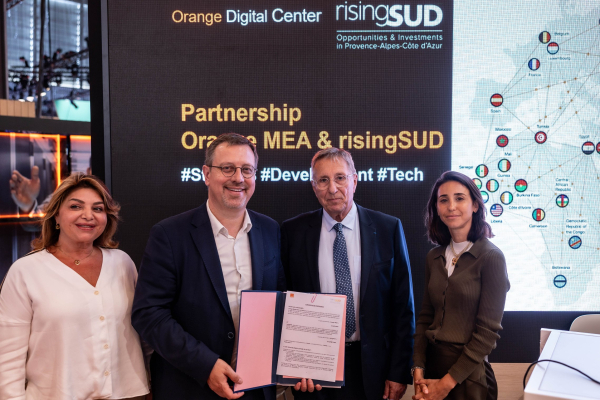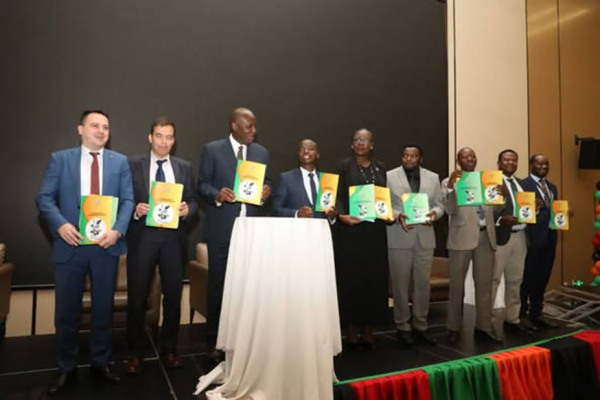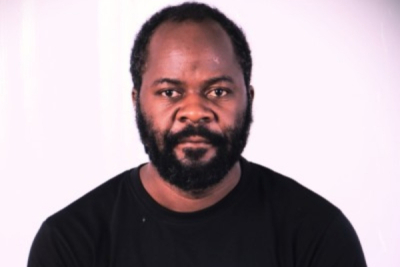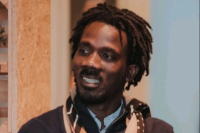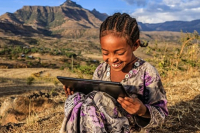Powered by a spirit of innovation, a new wave of African startups is setting its sights on international growth. In France, the southern region is emerging as a strategic hub and gateway, offering these companies a favorable environment in which to scale and gain global exposure.
Orange Africa and Middle East (OMEA) announced a partnership with risingSUD, the regional development agency for France's Provence-Alpes-Côte d’Azur (PACA) region, on Wednesday, June 11. The agreement, signed on the sidelines of the Viva Technology trade show in Paris, aims to support the establishment of African startups in France.
Jérôme Hénique, CEO of Orange Africa and Middle East, stated that the partnership with risingSUD is a crucial step in OMEA's ambition to promote African innovation globally. He added that the initiative extends the support Orange already provides to startups through its Orange Digital Centers. By facilitating their establishment and acceleration in France, especially in the southern region, Orange empowers young African companies to accelerate their growth.
The three-year partnership seeks to strengthen collaboration between the innovation ecosystems of Africa, the Middle East, and southern France. Startups within the Orange Digital Centers (ODC) network will receive tailored support to expand their operations in France. This support includes assistance with project development, access to funding, and networking opportunities with local economic partners.
The PACA region, which already hosts over 500,000 businesses, aims to solidify its position as a natural link between Europe and Africa. In 2024, risingSUD has already helped 14 African companies establish themselves in southern France. One such company is Guépard, a Tunisian startup incubated by the ODC in Tunis, which now has a presence in Marseille.
This partnership aligns with OMEA's ongoing efforts to champion African digital entrepreneurship. Operating in 17 countries across Africa and the Middle East, the ODC network provides free access to various services, including digital training, incubation, acceleration, and funding for innovative projects.
Ultimately, this collaboration is expected to strengthen economic and technological ties across the Mediterranean while simultaneously enhancing the global competitiveness of African innovation ecosystems.
By Samira Njoya,
Editing by Sèna D. B. de Sodji
The launch of the 2025 STI Policy marks a bold step toward transforming Zambia into a knowledge-driven economy, where innovation is central to development, competitiveness, and national resilience.
The Ministry of Technology and Science announced on June 5 that it has officially launched Zambia’s 2025 Science, Technology and Innovation (STI) Policy—an ambitious national strategy aimed at harnessing the power of innovation to position Zambia as a competitive player in the global economy. The policy outlines a transformative roadmap that aligns science, technology, and innovation with the country’s inclusive and sustainable development goals.
Speaking at the launch event, the Minister of Technology and Science, Hon. Felix Chipota Mutati, MP, emphasized that the policy reflects the government's commitment to using innovation as a tool for real economic transformation. “When President Hakainde Hichilema says we need to export one billion dollars’ worth of beef, it means we must improve cattle genetics, accelerate disease eradication, and apply science to scale up our productivity,” Mutati said. “Similarly, producing 10 billion tons of maize means translating research into practical agricultural outputs that put food on the table.”
Hon. Mutati highlighted that the policy comes at a time when global economies are being reshaped by cutting-edge technologies such as Artificial Intelligence, robotics, green energy, biotechnology, and space science.
The 2025 STI Policy rests on several strategic pillars. In the area of Research and Development (R&D), over K3 billion will be invested to strengthen Zambia’s national R&D ecosystem. This includes establishing national research priorities, upgrading scientific infrastructure, and creating a centralized database of ongoing research initiatives. Priority institutions will be empowered to carry out applied research aligned with Zambia’s economic and social goals.
For Artificial Intelligence and Emerging Technologies, the government has allocated K8 million to develop regulatory frameworks, ethical standards, educational programs, and awareness campaigns. These efforts aim to position Zambia as a regional hub for AI innovation.
The policy also introduces a robust framework for technology commercialization, which includes the creation of five new technology transfer offices, innovation hubs, and science parks. A national startup database and commercialization guidelines will support the growth and scaling of technology-driven enterprises across the country.
In terms of human capital development, the policy targets the training of at least 500 postgraduate students in STEM (Science, Technology, Engineering, and Mathematics) fields through scholarships, exchange programs, and mentorship. It also seeks to strengthen engagement with the Zambian diaspora and expand knowledge systems rooted in local traditions.
A major component of the policy is the preservation and development of indigenous knowledge systems. Legal frameworks and dedicated R&D centers will be established to protect and advance local innovations. The government also plans to increase Zambia’s Gross Expenditure on R&D (GERD) from the current 0.28% to 0.50% of GDP by 2029.
Zambia’s economy has long relied on commodity exports, particularly copper, which makes up around 70% of export earnings. The STI Policy provides a pathway to economic diversification, particularly in sectors such as agriculture, manufacturing, and healthcare, by supporting applied research, digital transformation, and technology commercialization.
Hikmatu Bilali
Meta has launched the Llama Impact Accelerator, a new program supporting startups across Sub-Saharan Africa to build open-source AI solutions that address local challenges in agriculture, healthcare, education, public services, financial inclusion, and security.
The six-week accelerator will run in Nigeria, Kenya, Senegal, and South Africa, offering equity-free funding, technical training, mentorship, and business support. The program is being implemented in collaboration with national innovation agencies and local ecosystem partners.
Each accelerator will culminate in a Demo Day, where teams present their Llama-powered solutions to a panel of local and international experts. Top teams will receive six months of extended support focused on product development, community building, and market expansion.
The Djiboutian government aims to position the country as a regional hub for AI innovation in the coming years. As part of this effort, a call for applications has been launched to recruit a national expert tasked with drafting the future national artificial intelligence strategy.
Djibouti's Ministry of Digital Economy and Innovation (MDENI), in partnership with the United Nations Economic and Social Commission for Western Asia (UNESCWA), announced on Sunday, June 8, the opening of applications for a National Artificial Intelligence Expert. This recruitment is a key step in developing the country's national AI strategy.
The chosen expert will be crucial in shaping the strategy by providing technical and analytical expertise. Their responsibilities include assessing Djibouti's current AI capabilities, identifying priority sectors for AI applications, holding consultations with local stakeholders, and crafting recommendations that align with international best practices.
This initiative highlights the government's goal to equip the country with a clear and structured AI strategy. The aim is to guide the development and ethical, inclusive, and secure use of AI across vital sectors. The upcoming national strategy must also address challenges related to education, research, data governance, and innovation.
The position is open to qualified Djiboutian specialists in artificial intelligence, digital policy, technological innovation, or information technology. Applications close on Monday, June 23.
By Samira Njoya,
Editing by Sèna D. B. de Sodji
Ulysse Agassin and Two Friends Launched an Online Supermarket, Letting Diaspora Communities Place Orders for Delivery to Loved Ones in Africa
Mes Courses Béninoises, a Franco-Beninese startup, has launched an e-commerce platform allowing diaspora members to easily order essential food and household products for their families in Benin. Headquartered in Cotonou, Benin, and Montpellier, France, the company was founded in 2021 by Ulysse Agassin, who Vincent Ferrera and Enki Roussel later joined.
Agassin explained to We Are Tech Africa that the service was born from his own experience as a Beninese student in France. "Like thousands of expatriates, I send money to my family every month. But the money is often quickly spent," he said. "In Cotonou, my family struggled to withdraw it on time—no nearby withdrawal agency due to poor connectivity, agencies closed on weekends, and you had to wait until Monday, so there was no way to make urgent withdrawals on weekends."
Currently, users place orders via the Mes Courses Béninoises website. Once completed, purchases are delivered directly to recipients. For residents in Benin, orders can also be made through WhatsApp, phone call, or the Gozem app. The startup plans to develop a dedicated mobile app in the future.
In a significant expansion, Mes Courses Béninoises opened a physical supermarket in Cotonou in March 2024. It offers a wide range of products at affordable prices with a fixed delivery fee of 700 FCFA (approximately $1.22), with plans for free deliveries in the future. The startup reports serving over 2,000 customers from the diaspora.
In the short term, Mes Courses Béninoises aims to develop its own delivery fleet to reach all localities in Benin. The company is also pursuing regional expansion, having already launched Mes Courses Togolaises in Togo and planning to expand into Côte d'Ivoire soon. Additionally, the startup is developing a B2B model for corporate clients, offering group deliveries to employees via a dedicated platform.
By Adoni Conrad Quenum,
Editing by Feriol Bewa
Born and educated in the Democratic Republic of Congo, he turned to information technology early on. Today, he develops digital solutions tailored to local economic realities.
Yannick Zagabe (photo), a Congolese computer scientist and tech entrepreneur, is the CEO and head of artificial intelligence at Netikash. His startup's mission is to "contribute to building a digital economy in the Democratic Republic of Congo and across Central Africa."
Founded in 2017, Netikash is a fintech company that provides digital tools for businesses to manage their commercial and financial operations. Its main product, Netikash Pay, is a digital wallet allowing users to transfer money, make online purchases, and combine multiple mobile money accounts into one interface.
The company also developed Netikash Payme, a service for online sales that enables users to create custom payment pages to generate income. For businesses with subscription models, Netikash Subscribe simplifies subscription management and allows companies to create shareable dedicated pages for recurring revenue.
Netikash POS, the startup's newest innovation, transforms a smartphone into a smart payment terminal compatible with various digital wallets.
Zagabe earned a Bachelor's degree in Information Technology from the Protestant University of Lubumbashi in 2012. He completed a business and entrepreneurship program at Skyline College in the United States in 2017.
Before his current role, he worked as a network engineer at Minerals and Metals Group, a mining sector company, from 2010 to 2016.
By Melchior Koba,
Editing by Sèna D. B. de Sodji
After being torn between two continents, he decided to launch his startup in his home country, Côte d'Ivoire. Through his company, he promotes African artisanal products.
Zaza Gnahoré moved to Belgium at age 14 to join his family. After several years there, he decided in 2019 to return to his native Côte d'Ivoire. A year later, he launched Djoloo, an e-commerce platform dedicated to showcasing African cultural creations.
Djoloo functions as both a display and a conduit, operating as a marketplace that enables African artisans to sell their products—including clothing, home decor, jewelry, and cosmetics—to a global customer base. Creators directly manage their own storefronts and handle product shipping, enhancing their independence and market visibility.
The platform supports multiple currencies, such as the euro, U.S. dollar, CFA franc, Swiss franc, yuan, and British pound, facilitating global market access for artisans often excluded from traditional distribution channels.
"My goal with this project is to highlight African culture, integrate it into everyday experiences, and create employment opportunities," Gnahoré said.
Beyond its e-commerce function, Djoloo also features editorial content. An integrated blog spotlights the inspiring journeys of African creators and shares success stories from partner brands. This storytelling approach aims to foster a community centered on the continent's creative spirit.
Gnahoré studied photography and cinematography at the INRACI Technical and Artistic Secondary School in Brussels from 2010 to 2011. Before his return to Côte d'Ivoire, he worked in 2013 as a video editor and colorist for Lire et Écrire, a continuing education initiative focused on promoting literacy in French-speaking Belgium.
By Melchior Koba,
Editing by Sèna D. B. de Sodji
The United Nations regards the Internet as a fundamental service, on par with electricity and clean drinking water. Aware of its role in Africa’s economic and social development, a call for widespread mobilization has been issued to boost investment.
Africa's internet penetration is growing at twice the global average, according to the International Telecommunication Union (ITU). Since 2005, the continent has seen an average annual growth rate of 16.7%, compared to the global average of 8%. Although this pace has slowed over the past decade to 10.7% annually versus 6.1% worldwide, Africa continues its sustained digital expansion. This rapid growth underscores a strong desire for digital integration, despite persistent deep divides compared to the rest of the world.
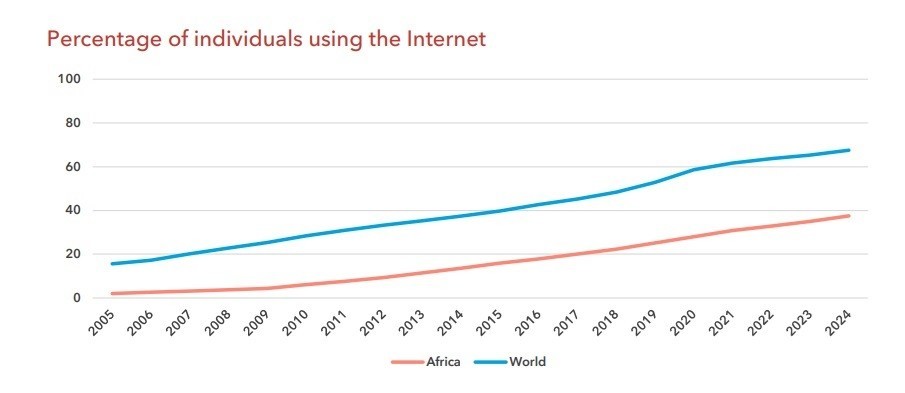
Source: ITU
In 2024, only 38% of the African population was connected to the internet, significantly less than the global average of 68%. This makes Africa the least connected region globally, emphasizing the structural and economic hurdles many African countries must overcome to ensure widespread and equitable access to digital technologies.
Gender Disparity
A notable inequality in Africa is the digital gender divide. In 2024, 43% of men used the internet compared to only 31% of women. This imbalance results in a Gender Parity Score (GPS) of 0.72, well below the global average of 0.94.
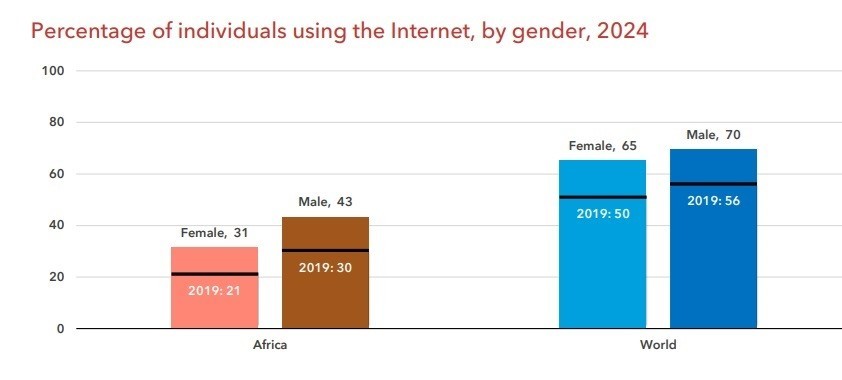
Source: ITU
While this trend shows improvement—the GPS has risen from 0.69 to 0.72 over the past five years—it remains insufficient to quickly reverse the structural underrepresentation of women in the digital sphere.
Age Divide
The digital divide in Africa also extends to generations. In 2024, 53% of young Africans aged 15 to 24 were connected to the internet, compared to 34% of the older population.
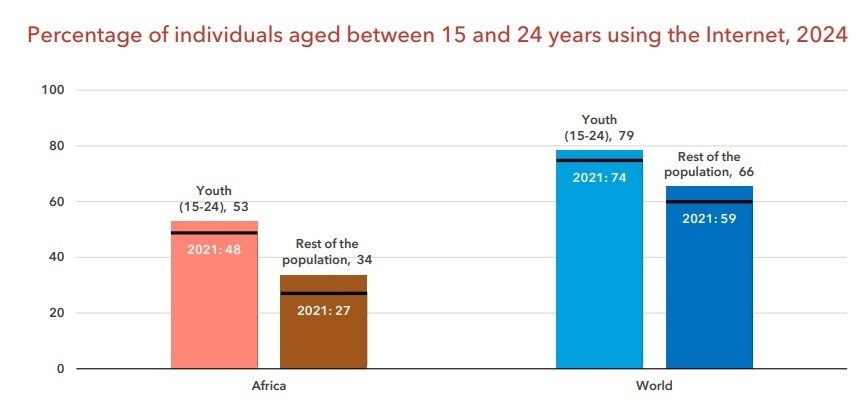
Source: ITU
This generational gap is more pronounced than the global average, though it is slowly narrowing. The ITU views young people's embrace of digital tools as a major asset for the continent's digital transformation. However, it also highlights the urgent need to expand access to older and marginalized populations to achieve truly universal digital inclusion.
Geographic Disparities
Internet connection distribution also reveals significant geographical fragmentation. In 2024, 57% of urban residents in Africa used the internet, whereas only 23% in rural areas had access. This 34-percentage point gap is comparable to the global average gap of about 35 points between urban (83%) and rural (48%) environments.
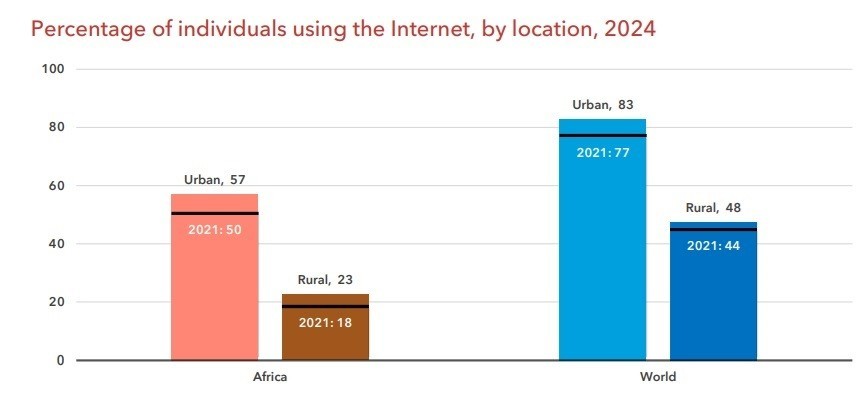
Source: ITU
Data from several African countries indicates a clear trend: higher overall internet penetration rates tend to correlate with smaller gaps between rural and urban areas. This suggests that targeted and sustained progress in infrastructure and public policy can reduce geographical inequalities.
A Call to Action
Given these pervasive disparities, it is clear that Africa cannot bridge its digital divide without collective and coordinated action. Investing in infrastructure, especially in rural and remote areas, is crucial for more equitable access to digital tools. Similarly, inclusive public policies that consider gender, age, and location must be systematically implemented to foster a fairer digital society.
Governments, telecom operators, NGOs, and development partners play a fundamental role in addressing the continent's many digital divides. While Africa continues to demonstrate above-average growth in internet access, this momentum requires structural measures to ensure it benefits all segments of the population without exception. In an increasingly digital world, digital exclusion equates to a form of social marginalization. Therefore, accelerating efforts for digital inclusion at all levels is imperative for Africa to fully capitalize on the opportunities presented by digital transformation.
Muriel EDJO
Ghana’s digital economy is growing rapidly, with increasing reliance on fintech, e-commerce, and digital transactions. Strong legal frameworks are essential to protect businesses and consumers from cyber threats and ensure compliance with international data protection standards.
Ghana’s Ministry of Communication, Digital Technology and Innovations (MoCDTI) has announced plans to introduce 15 new digital laws aimed at strengthening cybersecurity, data protection, and digital economy regulation. The announcement was made on June 8 during a two-day workshop with Parliament’s Select Committee on Information and Communications, where the Ministry reaffirmed its commitment to transparency and collaboration in shaping the country’s digital future.
The proposed laws will focus on several critical areas, including cybersecurity regulations, data protection, and digital economy governance. As cyber threats continue to evolve, Ghana needs a robust legal framework to safeguard businesses and individuals from digital risks. The cybersecurity laws will enhance protections against cyberattacks, ensuring compliance with global security standards and reinforcing national resilience against digital threats. Additionally, the data protection laws will strengthen privacy rights, regulating how personal and corporate data is collected, stored, and used. With the increasing reliance on digital transactions, these measures will provide citizens with greater control over their information while ensuring businesses adhere to ethical data practices.
Another key aspect of the legislative agenda is the governance of Ghana’s digital economy. As fintech, e-commerce, and digital transactions become more prevalent, clear policies are needed to regulate these sectors effectively. The new laws will establish guidelines for digital financial services, ensuring consumer protection and fostering innovation.
Institutional reforms are also a major focus of the proposed legislation. One of the most significant changes discussed at the workshop is the transformation of the National Information Technology Agency (NITA) into a purely regulatory body. Currently, NITA operates both as a regulator and a service provider, which can create conflicts in governance. Under the new framework, its service-provider functions and government IT assets will be transferred to a separate entity, ensuring a clearer distinction between regulation and service delivery. This transition is expected to improve efficiency, streamline operations, and enhance oversight of Ghana’s digital infrastructure.
With Ghana’s digital economy expanding rapidly, these laws are essential for protecting citizens and businesses from cyber risks, encouraging investment in technology, and ensuring compliance with international data protection standards. The Ministry’s proactive approach signals a strong commitment to fostering innovation while maintaining security and accountability in the digital space.
The proposed laws will be rolled out in phases for parliamentary review, allowing for thorough discussions and stakeholder engagement. As Ghana positions itself as a regional digital leader, these legislative reforms will play a crucial role in shaping the country’s tech-driven future, ensuring that policies and infrastructure developments support sustainable growth and innovation.
Ghana has been actively developing laws to regulate and strengthen its digital economy. These laws aim to enhance consumer protection, regulate digital transactions, and ensure compliance with international standards. The country has existing digital laws such as the Electronic Transactions Act (2008), which grants legal recognition for electronic records, and the Payment Systems and Services Act (2019), which regulates digital financial services. The Cybersecurity Act (2020) established the Cybersecurity Authority, ensuring national security against cyber threats.
Hikmatu Bilali
In the Face of Rising Digital Sovereignty Challenges, Congo Calls for Stronger Africa–Russia Cooperation. Léon Juste Ibombo advocates for a partnership-based approach built on skills exchange, sovereign technologies, and capacity building.
Congo's Minister of Posts, Telecommunications and the Digital Economy, Léon Juste Ibombo (photo), called for pragmatic cooperation between Africa and Russia, emphasizing digital sovereignty as a central challenge. He made these remarks during the "Russia–Africa: Shared and Sustainable Digital Sovereignty" session at the Global Digital Forum 2025, held June 5-6 in Nizhny Novgorod.
In his address, Ibombo outlined six priority areas for collaboration. He advocated for the transfer of skills in artificial intelligence, cybersecurity, and big data. He also proposed the development of shared computing centers for sovereign data governance, and the co-design of open-source solutions tailored to African needs. Other key areas included exchanges on digital taxation and industrial traceability, the organization of joint training programs, and the alignment of African and Russian positions within international digital regulatory bodies.
Congo's appeal comes as several African countries have already begun digital cooperation with Russia. Zimbabwe, for instance, has implemented an e-governance program with Moscow to boost public administration efficiency and combat corruption. Angola has signed a digital agreement with Russia covering fiber-optic networks, telecommunications satellites—including the AngoSat-2 project—and cybersecurity. Furthermore, the expansion of Russia's sovereign software MyOffice in several African nations, such as Cameroon, the Democratic Republic of Congo, and Guinea, signals a clear push for digital independence.
Russia holds a significant technological advantage, with established expertise in cybersecurity, sovereign software development, and sensitive data infrastructure. Through its existing digital partnerships, Russia offers Africa alternative solutions to the model of major Western platforms, while also aiming to train African operators in best practices.
This partnership could move Africa closer to a more autonomous digital model, built on dedicated infrastructure, strengthened local skills, and increased sovereignty in international negotiations. By diversifying its technological partnerships, the continent is positioning itself to build robust, sustainable, and politically independent digital foundations.
By Samira Njoya,
Editing by Sèna D. B. de Sodji
More...
With the launch of its nanosatellite Gaindesat-1A, Senegal has taken a major step forward in its space strategy. The country now aims to position space as a strategic lever for development and sovereignty.
Senegal's General Staff of the Armed Forces (EMGA) and the Senegalese Space Studies Agency (ASES) signed a five-year memorandum of understanding on Thursday, June 5, to develop the country's first national satellite constellation. This strategic initiative aims to enhance technological sovereignty and strengthen national defense capabilities.
"By creating ASES, the Senegalese government has made its ambitions clear: to position the space sector as a cross-cutting lever for impact across all domains—starting with security," said Maram Kaïré, Director General of ASES, praising the government’s forward-thinking approach.
The project involves deploying a constellation of nanosatellites. These small, orbiting satellites will work in coordination to provide continuous and comprehensive coverage of Senegal’s territory. Key applications include Earth observation to support security, environmental monitoring, and natural resource management.
European aerospace company Prométhée Earth Intelligence will provide technical support. Prométhée, which specializes in satellite technology and Earth observation data analytics, will collaborate closely with Senegalese authorities to co-develop a sovereign, sustainable, and inclusive space capability.
Once operational, the satellite constellation will enable real-time surveillance of national territory. This will meet security needs while also supporting biodiversity protection, risk prevention, and economic development. The technology is expected to have applications in areas such as precision agriculture, land use planning, and infrastructure management.
With fewer than 50 African nations possessing national satellites, this agreement represents a major step forward in Senegal’s technological sovereignty. It is part of the broader SenSAT national space program, which seeks to establish autonomous space capabilities for the country.
Beyond security, the project is poised to drive innovation, create high-value jobs, and enhance Senegal’s control over geospatial data, solidifying space as a pillar of long-term strategic independence.
By Samira Njoya,
Editing by Sèna D. B. de Sodji
Determined to modernize agriculture, he is leveraging technology to tackle Africa’s food challenges with practical, scalable solutions.
Baraka Chijenga (photo), a Tanzanian entrepreneur, is the founder and CEO of Kilimo Fresh, a Dar es Salaam-based startup that is using technology and data analytics to transform agricultural supply chains. Since its launch in 2019, the company has been connecting hundreds of smallholder farmers with thousands of retailers, hotels, and restaurants—aiming to streamline distribution and drastically reduce food waste.
At the heart of Kilimo Fresh’s model is an intuitive online platform that allows buyers to order fresh produce and dry goods, which are then delivered directly to their doorstep. The company relies on predictive analytics to anticipate demand, optimize inventory, and minimize losses. It also supports farmers in adopting sustainable practices and integrating modern agricultural technologies.
On Thursday, June 5, Kilimo Fresh was named a finalist in the AYuTe NextGen competition, an initiative led by Heifer International Africa that highlights tech-driven ventures tackling the agricultural sector’s most pressing challenges.
Before launching Kilimo Fresh, Chijenga co-founded Eliminex Tanzania Limited, a company focused on organic fruit and vegetable production, free from synthetic inputs and agrochemicals. Founded in 2014, Eliminex laid the groundwork for his mission to promote sustainable agriculture.
A 2015 graduate of Mzumbe University in Tanzania, where he earned a bachelor’s degree in entrepreneurial development, Chijenga began his career as a finance officer at Pyramid Pharma, a healthcare solutions provider. From 2017 to 2019, he expanded his horizons in West Africa, helping Pacific Diagnostics scale its operations in Nigeria and Ghana.
In 2021, he gained continental recognition as a finalist in the GoGettaz Agripreneur Prize Competition, which spotlights the most promising young agri-entrepreneurs across Africa.
By Melchior Koba,
Editing by Sèna D. B. de Sodji
A serial entrepreneur, he combines technical and financial expertise to modernize local commerce across Africa.
Sidy Niang (photo) is one of the co-founders of Maad, a Senegalese start-up that is modernizing supply chains to serve small retailers. Launched in 2020, Maad leverages technology to tackle a core challenge in African commerce: fragmented and inefficient distribution.
Through its digital platform, Maad connects suppliers directly to retailers. Store owners can order, pay, and arrange delivery with just a few clicks—reducing stockouts and logistics costs. “With our technology and logistics infrastructure, we support the economic development of traditional retail and the food and beverage businesses that are part of the Maad community,” the company says.
For suppliers, Maad offers real-time product performance tracking and benchmarking tools. A mobile app lets them manage sales teams and marketing operations. Their products also gain exposure to a network of 20,000 retailers, boosting sales growth.
A multi-faceted entrepreneur, Sidy Niang is also co-founder and investor in Joloff Food, a virtual corporate canteen based in Dakar. Founded in 2019, the service delivers over 6,000 meals a month.
Niang holds a Master’s in Finance and Strategy from CentraleSupélec in France, earned in 2016. He began his career in 2012 at Louis Vuitton in Paris, working as a consultant optimizing supply chains using emerging technologies.
In 2013, he joined Millicom (Tigo) in Senegal as a technical support engineer, before moving to BNP Paribas in 2014 as an M&A analyst. In 2015, he joined Mediterrania Capital Partners in Morocco as an investment analyst. The following year, he moved to the International Finance Corporation (IFC), where he served successively as an analyst and associate in investment.
By Melchior Koba,
Editing by Sèna D. B. de Sodji
Senegal’s start-up ecosystem is rapidly expanding, driven by both government and private initiatives. Technological innovation is seen as a strategic lever to boost the economy and tackle development challenges.
Senegal's Ministry of Communication, Telecommunications and the Digital Economy (MCTN) and U.S. tech group Meta announced Thursday, June 5, the launch of Llama Impact. This new acceleration program aims to support Senegalese startups leveraging open-source artificial intelligence (AI) in high-impact sectors.
The program targets early-stage ventures, focusing on innovations in healthcare, including telemedicine, diagnostic tools, and AI-driven medical advice. It also emphasizes agriculture, covering areas like soil analysis, crop monitoring, and market access, as well as education, with a focus on EdTech platforms and digital training. A "Carte Blanche" category is additionally available for high-potential projects outside these traditional domains.
Selected startups will participate in six weeks of hands-on training, technical mentorship, and intensive development sessions. The program will conclude with a demo day, where participants will present their solutions to investors and compete for up to $25,000 in non-dilutive funding. A six-month post-program support phase will follow to consolidate progress and facilitate access to further opportunities. Applications for the program are open until June 27.
This initiative is part of Senegal's broader New Technological Deal, the country's national digital strategy unveiled in February. The plan aims to designate 500 innovative startups, train 100,000 digital graduates annually, and create 150,000 direct jobs in the sector by 2034. It also seeks to establish Senegal as a leading innovation hub in Francophone Africa.
By encouraging local startups to adopt open-source AI, the program intends to reduce reliance on foreign technologies, foster homegrown innovation, and strengthen the country's digital sovereignty. Despite these efforts, challenges persist, particularly concerning access to financing, technical supervision, and the scaling of developed solutions.
By Samira Njoya,
Editing by Sèna D. B. de Sodji


